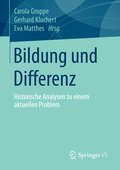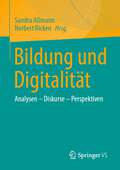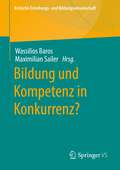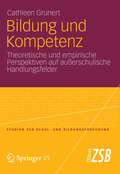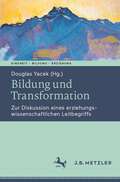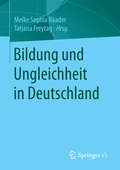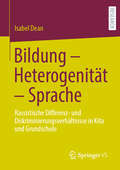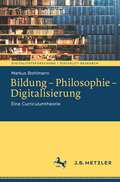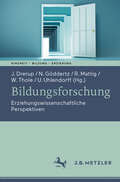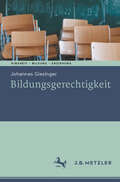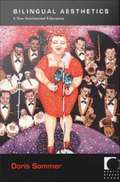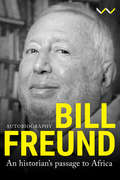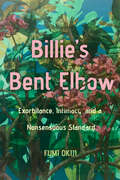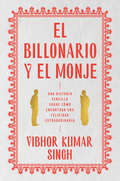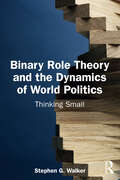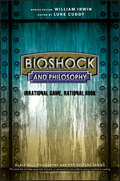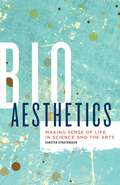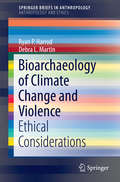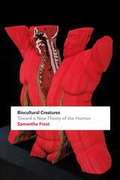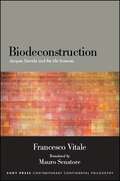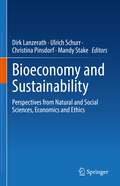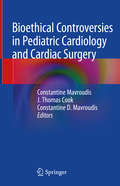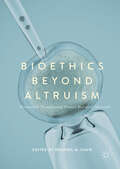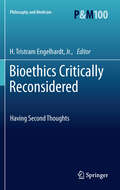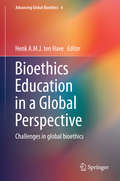- Table View
- List View
Bildung und Differenz: Historische Analysen zu einem aktuellen Problem
by Carola Groppe Gerhard Kluchert Eva MatthesIn der empirischen Bildungsforschung wie in der erziehungswissenschaftlichen Diskussion spielt die Aufklärung des Zusammenhangs von Bildung und Differenz eine wichtige Rolle. Der Band, hervorgegangen aus einer Tagung der Sektion Historische Bildungsforschung in der Deutschen Gesellschaft für Erziehungswissenschaft, will zu dieser Aufklärung beitragen, indem er die Problemanalyse um die historische Dimension bereichert und die Wechselbeziehung von Bildung und Differenz in ihrer Entstehung und Veränderung erfasst. Dabei werden unterschiedliche Differenzkategorien wie soziale Herkunft, Geschlecht, Behinderung und ethnische Zugehörigkeit in den Blick genommen und unterschiedliche Aspekte von Bildung berücksichtigt.
Bildung und Digitalität: Analysen – Diskurse – Perspektiven
by Norbert Ricken Sandra AßmannMit ›Bildung‹ und ›Digitalität‹ wird ein intensiv diskutiertes Spannungsfeld markiert: Einerseits wird oft die ›digitale Rückständigkeit‹ von Schule beklagt, andererseits aber lassen sich auch pädagogische Skepsis und Hemmnisse nicht einfach übersehen. An dieser Spannung setzen die Beiträge des Bandes an und fragen sowohl nach den Herausforderungen der ›Bildung‹ durch ›Digitalität‹ als auch umgekehrt nach den Anforderungen an ›Digitalität› durch ›Bildung‹. Das macht aber nötig, ›Digitalisierung‹ nicht bloß als (gar technische) Anwendungsproblematik und didaktische Herausforderung aufzunehmen, sondern auch (grundlagen-)theoretisch zu reflektieren. Dabei werden entlang der Fragen nach den jeweiligen Medien-, Subjekt- und Wissensformationen des ›Digitalen‹ auch Konturen eines pädagogischen Strukturwandels erkennbar und diskutierbar.
Bildung und Kompetenz in Konkurrenz? (Kritische Erziehungs- und Bildungswissenschaft)
by Wassilios Baros Maximilian SailerDas zeittypische Verständnis reduziert Bildung in großem Maße auf schulische Leistung, den Erwerb von Qualifikationen und den Nachweis von Kompetenzen. Bildung, das ist nicht erst seit den großen Schulleistungsstudien bekannt, steht immer im Spannungsverhältnis unterschiedlicher Interessen, z.B. ökonomischer und pädagogischer. In diesem Band sollen diese Spannungsverhältnisse thematisiert und kritisch reflektiert werden und die Vielschichtigkeit bzw. Ganzheitlichkeit von Bildung aufgezeigt werden.
Bildung und Kompetenz: Theoretische und empirische Perspektiven auf außerschulische Handlungsfelder (Studien zur Schul- und Bildungsforschung #44)
by Cathleen GrunertBildung und Kompetenz als Begriffskonstruktionen werden im öffentlichen Diskurs, aber oft auch auf wissenschaftlichem Terrain vor allem mit schulischen Formen des Lernens in Verbindung gebracht. Dementsprechend sind empirische Forschungen im Kontext "Empirischer Bildungsforschung" aktuell stark schulbezogen und in ihren theoretischen Bezügen auf die Begriffe von Bildung und Kompetenz meist einseitig produktbezogen. Empirische Untersuchungen, die theoretisch und methodisch begründet nach der Rolle außerschulischer Handlungsfelder für die Lern- und Bildungsprozesse von Kindern und Jugendlichen fragen, sind aktuell jedoch vergleichsweise selten. In diesem Buch wird im Anschluss an eine Analyse der beiden zentralen Begriffe von Bildung und Kompetenz und ihrer Verschränkungen sowie eine kritische Sichtung des aktuellen nationalen und v.a. us-amerikanischen Forschungsstand danach gefragt, wie man sich diesem Feld in theoretischer und methodischer Perspektive nähern kann. Dafür wird auf den Ansatz der activity theory zurückgegriffen, der sowohl einen theoretischen als auch einen forschungsheuristischen Rahmen bietet, um sich dieses Feld in seiner Komplexität erschließen zu können.
Bildung und Transformation: Zur Diskussion eines erziehungswissenschaftlichen Leitbegriffs (Kindheit – Bildung – Erziehung. Philosophische Perspektiven)
by Douglas YacekDie Idee der Transformation ist in der internationalen Erziehungswissenschaft geradezu allgegenwärtig geworden. Bildung wird in diesem Rahmen nicht mehr allein als Aneignung von Lehrinhalten, Kompetenzen oder kanonisierten Bildungsgütern verstanden, sondern vornehmlich als Prozess charakterisiert, in dem sich unsere Beziehung zu uns Selbst, zu Anderen und zur Welt grundlegend verändert. Doch was heißt es, eine Transformation zu erleben? Welche Transformationstheorien und -ansätze gibt es in der Erziehungswissenschaft? Wozu sind sie nützlich und wo haben sie Schwachstellen? Dieser Band befasst sich mit diesen und anderen zentralen Fragen der zeitgenössischen Diskussion zu Bildung und Transformation, um einen systematischen Überblick über dieses wichtige Forschungsfeld darzubieten.
Bildung und Ungleichheit in Deutschland
by Meike Sophia Baader Tatjana FreytagAnliegen des Bandes ist es, aufzuzeigen, wie multifaktoriell Bildungsungleichheit ist. Er kann auch als ein Beitrag der Bildungsforschung zur aktuellen R#65533;ckkehr der Kategorie der sozialen Ungleichheit angesichts un#65533;bersehbarer gesellschaftlicher Abkoppelungsprozesse gesehen werden. Die herausragende Bedeutung von Bildung f#65533;r die Lebensperspektiven junger Menschen in Deutschland ist unbestritten. Der Erwerb schulischer und beruflicher Bildungsqualifikationen spielt eine Schl#65533;sselrolle im sozialen Integrationsprozess. Bildungsabschl#65533;sse sind entscheidend f#65533;r die Chancen auf gesellschaftlich anerkannte Positionen, auch wenn Bildung allein l#65533;ngst kein Garant mehr daf#65533;r darstellt. Da sich die Auswirkungen von sozialer Benachteiligung jeweils kumulativ-kontextuell darstellen, werden die Bereiche Familie und Kindheit, Schule und Hochschule sowie au#65533;erschulische Bildung und Weiterbildung in den Blick genommen und es wird nach Durchquerungen, Genderaspekten, Intersektionalit#65533;t und Inklusion gefragt.
Bildung – Heterogenität – Sprache: Rassistische Differenz- und Diskriminierungsverhältnisse in Kita und Grundschule
by Isabel DeanIm Unterschied zum Sekundarschulbereich gelten Kita und Grundschule zumeist als Bildungsabschnitte, in denen alle Kinder gemeinsam, also unabhängig von Herkunft und diverser sozialer und natio-ethno-kulturell codierter Hintergründe zusammen lernen. Jedoch ereignen sich auch im Übergang von der Kita zur Grundschule diverse rassistische und mehrfachdiskriminierende Dynamiken. Die vorliegende Studie zeichnet verschiedene dieser potenziell diskriminierenden und segregierenden „neuralgischen Punkte“ nach, die sich auf der Ebene verschiedener Akteur*innengruppen, Diskurse, Konfliktlinien und Praktiken vollziehen.
Bildung – Philosophie – Digitalisierung: Eine Curriculumtheorie (Digitalitätsforschung / Digitality Research)
by Markus BohlmannWelchen Beitrag kann philosophische Bildung zur Digitalisierung leisten? Was sind die Inhalte der Philosophie, die uns die Digitalität verstehen und beurteilen helfen? Welche Formen der philosophischen Kritik an der Digitalisierung sind heute didaktisch noch sinnvoll? Und wie kann philosophische Bildung dabei helfen, digitale Technologien zu hinterfragen? Das sind die Fragen dieses Buches.
Bildungsforschung: Erziehungswissenschaftliche Perspektiven (Kindheit – Bildung – Erziehung. Philosophische Perspektiven)
by Johannes Drerup Werner Thole Nina Göddertz Ruprecht Mattig Uwe UhlendorffDer Begriff ‚Bildungsforschung‘ erweist sich als nicht minder umstritten als der Begriff der Bildung selbst. Bildungsforschung fungiert in der Diskussion häufig als eine Art Regenschirmbegriff, mit dem ein Forschungsprofil markiert wird, das es ermöglichen soll, schulische, insbesondere unterrichtsbezogene Bildungsprozesse empirisch zu erfassen und von Schüler*innen zu erwerbende Kompetenzen festzulegen und mit Hilfe quantitativer Verfahren zu evaluieren. Im Rahmen von anderen Forschungstraditionen geht man auf kritische Distanz zu diesem inhaltlich und methodisch allzu sehr eingeschränkten Verständnis von Bildungsforschung. Im Zentrum des Bandes stehen erziehungswissenschaftliche Zugänge und Beiträge zur Bildungsforschung und damit verbundene disziplinäre Perspektiven und forschungsmethodologische Fragestellungen.
Bildungsgerechtigkeit (Kindheit – Bildung – Erziehung. Philosophische Perspektiven)
by Johannes GiesingerIn unseren Bildungssystemen bestehen erhebliche soziale Ungleichheiten: Kinder aus sozial benachteiligten Familien sind schulisch weniger erfolgreich als Kinder wohlhabender und gebildeter Eltern, viele von ihnen erreichen minimale Kompetenzziele nicht. Ist das ungerecht? Dieses Buch nimmt eine normative Perspektive auf Ungleichheiten im Bildungsbereich ein. Es wird diskutiert, inwiefern es Sinn ergibt, Gleichheit (oder Chancengleichheit) anzustreben. Als Alternative wird eine Konzeption angemessener Bildung formuliert, nach der alle eine bestimme Schwelle in der Entwicklung relevanter Fähigkeiten entwickeln sollen. Die Tatsache, dass viele Heranwachsende heute diese Schwelle nicht erreichen, wird als die zentrale Bildungsungerechtigkeit dargestellt. Vor diesem Hintergrund wird das Problem der Begabtenförderung ebenso diskutiert wird die die Rolle von Privatschulen. Es geht um die Rechte der Eltern und das Wohl der Kinder, um die Digitalisierung der Schule und die Bedeutung von Bildungsgerechtigkeit für die Demokratie.
Bilingual Aesthetics: A New Sentimental Education
by Doris SommerKnowing a second language entails some unease; it requires a willingness to make mistakes and work through misunderstandings. The renowned literary scholar Doris Sommer argues that feeling funny is good for you, and for society. In Bilingual Aesthetics Sommer invites readers to make mischief with meaning, to play games with language, and to allow errors to stimulate new ways of thinking. Today's global world has outgrown any one-to-one correlation between a people and a language; liberal democracies can either encourage difference or stifle it through exclusionary policies. Bilingual Aesthetics is Sommer's passionate call for citizens and officials to cultivate difference and to realize that the precarious points of contact resulting from mismatches between languages, codes, and cultures are the lifeblood of democracy, as well as the stimulus for aesthetics and philosophy. Sommer encourages readers to entertain the creative possibilities inherent in multilingualism. With her characteristic wit and love of language, she focuses on humor--particularly bilingual jokes--as the place where tensions between and within cultures are played out. She draws on thinking about humor and language by a range of philosophers and others, including Sigmund Freud, Immanuel Kant, Ludwig Wittgenstein, Hannah Arendt, and Mikhail Bakhtin. In declaring the merits of allowing for crossed signals, Sommer sends a clear message: Making room for more than one language is about value added, not about remediation. It is an expression of love for a contingent and changing world.
Bill Freund: An historian’s passage to Africa
by Bill FreundThe first biography of an eminent historian of South AfricaBill Freund, the late social historian and leading analyst of African history, passed away in 2020 soon after finishing his autobiography. Often described as the academy’s ‘outsider insider’, he was an eminent South African historian who published prodigiously in the areas of labour, capital and economic history. What influenced this American-educated academic to become such an astute and trusted observer of the political economy in Africa? We follow Bill’s intellectual journey from a modest Jewish home in Chicago in the 1950s to the Universities of Chicago, Yale, Ahmadu Bello University in Nigeria and Dar-es-Salaam, Tanzania, and finally to a permanent teaching position at the University of KwaZulu-Natal in Durban, South Africa. Peppered in between the commentaries on academic life are stories of his travels, poems he wrote for loved ones, and endearing anecdotes of friendships that shaped his life. As an ‘outsider’, both in the United States and abroad, he is able to offer rich insights into the world of Africanists and their scholarship on different continents. His thoughtful and balanced observations on late- and post-apartheid South Africa are especially interesting and refreshing. This posthumously published autobiography will give deeper insight into this unusual man and the world that shaped him – and which he in turn influenced through a deep commitment to rigorous scholarship. It includes a select bibliography of Bill Freund’s many publications as well as a foreword by Robert Morrell on the making of this autobiography.
Billie’s Bent Elbow: Exorbitance, Intimacy, and a Nonsensuous Standard
by Fumi OkijiDeeply informed by jazz, Billie's Bent Elbow explores the nonsensical and nonsensuous in black radical thought and expression. Extending the encounter between black study, Frankfurt School critical theory, and sound studies staged in her first book, Jazz as Critique, and, crucially, bringing Yoruba aesthetics into the conversation, Okiji attunes to various sites of intemperance and equivocation in thought and music. Billie's Bent Elbow eschews the parsimonious tendencies of the Western philosophical tradition, in its contribution to a shared project of improvised correspondence that finds its criticality in its heterophony of approach and intention. The book ranges from Haitian revolutionaries' rendition of "La Marseillaise," to Cecil Taylor's synesthetic poetics, to the aporetic mien of the orisha Esu, to Billie Holiday's undulating arm. What is more, by way of her intense fascination with these sites of fantastic noise, Okiji brings our attention to a galaxy of intimacies that flash up in her experiments in array and correspondence. The nonsensuous standard Okiji cultivates in this musical and essayistic book, in concert with a host of theorists, musicians and artists, is as much a statement of non-citizenry as it is preparation for intoxicated gathering.
Billionaire and the Monk, The \ El Billonario y el Monje (Spanish edition): Una historia sencilla sobre cómo encontrar una felicidad extraordiaria
by Vibhor Kumar SinghLa mayor sabiduría se encuentra a menudo en el conocimiento más simple.¿Qué pasa si aprende que todo lo que le han enseñado sobre la felicidad es falso? ¿Qué pasa si te das cuenta de que la felicidad no es una meta y, por lo tanto, no se puede lograr? ¿Qué pasa si descubre que es el camino ordinario el que conduce a un tesoro extraordinario?Esta es una historia sobre cómo dos hombres de diferentes ámbitos de la vida aprenden que no se requieren ropas de honor ni la renuncia total a la vida mundana para disfrutar del ser humano más fundamental: la felicidad.Es una historia sobre la comprensión de que la felicidad no es un enigma filosófico, sino un estado mental alcanzable y cómo uno puede apreciar las mayores alegrías a través de los actos más simples y pequeños de la vida diaria.Permítanos simplificar la felicidad y encontrar la respuesta extraordinaria a la pregunta ordinaria: ¿eres feliz?
Binary Role Theory and the Dynamics of World Politics: Thinking Small
by Stephen G. WalkerThis book develops a binary role theory of world politics extending from the micro-analysis of foreign policy to the macro-analysis of world politics. The effort employs analytical tools outside of role theory to extend role concepts from agents spatially to finitely generated systems and temporally to different phases and sequences of social interaction between pairs of agents as ego and alter. There is an initial emphasis on “thinking small” about the interactions of agents as the building blocks of world politics and then tracing the processes of aggregation that generate the emergence and evolution of larger patterns of international relations over time.Empirical case studies from different historical eras and geographical regions illustrate the application of binary role theory models to problems of conflict management, alliance formation, diplomatic engagement, and transitions in world order. The analysis employs complex adaptive systems (CAS) analysis to go beyond the study of political science in building bridges to the natural sciences by using concepts and models from the Standard Model in physics and the Modern Synthesis in biology. This book will interest an audience of foreign policy scholars and international relations theorists as well as students of quantum and computational models of world politics.
BioShock and Philosophy
by William Irwin Luke CuddyConsidered a sign of the 'coming of age' of video games as an artistic medium, the award-winning BioShock franchise covers vast philosophical ground. BioShock and Philosophy: Irrational Game, Rational Book presents expert reflections by philosophers (and Bioshock connoisseurs) on this critically acclaimed and immersive fan-favorite. Reveals the philosophical questions raised through the artistic complexity, compelling characters and absorbing plots of this ground-breaking first-person shooter (FPS) Explores what BioShock teaches the gamer about gaming, and the aesthetics of video game storytelling Addresses a wide array of topics including Marxism, propaganda, human enhancement technologies, political decision-making, free will, morality, feminism, transworld individuality, and vending machines in the dystopian society of Rapture Considers visionary game developer Ken Levine's depiction of Ayn Rand's philosophy, as well as the theories of Aristotle, de Beauvoir, Dewey, Leibniz, Marx, Plato, and others from the Hall of Philosophical Heroes
Bioaesthetics: Making Sense of Life in Science and the Arts (Posthumanities #43)
by Carsten StrathausenIn recent years, bioaesthetics has used the latest discoveries in evolutionary studies and neuroscience to provide new ways of looking at art and aesthetics. Carsten Strathausen&’s remarkable exploration of this emerging field is the first comprehensive account of its ideas, as well as a timely critique of its limitations. Strathausen familiarizes readers with the basics of bioaesthetics, grounding them in its philosophical underpinnings while articulating its key components. Importantly, he delves into the longstanding problem of the &“two cultures&” that separate the arts and the sciences. Seeking to make bioaesthetics a more robust way of thinking, Strathausen then critiques it for failing to account for science&’s historical and cultural assumptions. At its worst, he says, biologism reduces artworks to mere automatons that rubber-stamp pre-established scientific truths. Written with a sensitive understanding of science&’s strengths, and willing to refute its best arguments, Bioaesthetics helps readers separate the sensible from the specious. At a time when humanities departments are shrinking—and when STEM education is on the rise—Bioaesthetics makes vital points about the limitations of science, while lodging a robust defense of the importance of the humanities.
Bioarchaeology of Climate Change and Violence: Ethical Considerations (SpringerBriefs in Anthropology #6)
by Debra L. Martin Ryan P. HarrodThe goal of this monograph is to emphasize with empirical data the complexity of the relationship between climate change and violence. Bioarchaeology is the integration of human skeletal remains from ancient societies with the cultural and environmental context. Information on mortality, disease, diet and other factors provide important data to examine long chronologies of human existence, particularly during periods of droughts and life-threatening climate changes. Case studies are used to reconstruct the responses and short and long-term adaptations made by groups before, during and after dramatic changes in weather and climate. Interpersonal and group violence is also analyzed. The authors find that while in some cases there is an increase in trauma and violence, in other cases there is not. Human groups are capable of avoiding violent altercations and increasing broad networks of cooperation that help to mitigate the effects of climate change. A case study from the U. S. Southwest is provided that shows the variable and surprising ways that ancient farmers in the past dealt with long term droughts.
Biocultural Creatures: Toward a New Theory of the Human
by Samantha FrostIn Biocultural Creatures, Samantha Frost brings feminist and political theory together with findings in the life sciences to recuperate the category of the human for politics. Challenging the idea of human exceptionalism as well as other theories of subjectivity that rest on a distinction between biology and culture, Frost proposes that humans are biocultural creatures who quite literally are cultured within the material, social, and symbolic worlds they inhabit. Through discussions about carbon, the functions of cell membranes, the activity of genes and proteins, the work of oxygen, and the passage of time, Frost recasts questions about the nature of matter, identity, and embodiment. In doing so, she elucidates the imbrication of the biological and cultural within the corporeal self. In remapping the relation of humans to their habitats and arriving at the idea that humans are biocultural creatures, Frost provides new theoretical resources for responding to political and environmental crises and for thinking about how to transform the ways we live.
Biodeconstruction: Jacques Derrida and the Life Sciences (SUNY series in Contemporary Continental Philosophy)
by Francesco VitaleIn Biodeconstruction, Francesco Vitale demonstrates the key role that the question of life plays in Jacques Derrida's work. In the seminar La vie la mort (1975), Derrida engages closely with the life sciences, especially biology and evolution theory. Connecting this line of thought to his analysis of cybernetics in Of Grammatology, Vitale shows how Derrida develops a notion of biological life as itself a sort of text that is necessarily open onto further articulations and grafts. This sets the stage for the deconstruction of the traditional opposition between life and death, conceiving of death as an internal condition of the constitution of the living rather than being the opposite of life. It also provides the basis for the deconstruction of the rigidly deterministic concept of the genetic program, an insight that anticipates recent achievements of biological research in epigenetics and sexual reproduction. Finally, Vitale argues that this framework can enrich our understanding of Derrida's late work devoted to political issues, connecting his use of the autoimmunitarian lexicon to the theory of cellular suicide in biology.
Bioeconomy and Sustainability: Perspectives from Natural and Social Sciences, Economics and Ethics
by Ulrich Schurr Dirk Lanzerath Christina Pinsdorf Mandy StakeIn this edited volume, scientists from different disciplines discuss modern biotechnological processes and a knowledge-based bioeconomy. The authors base their arguments on ecological, economic, legal, social and ethical aspects. Moreover, they explore the opportunities, risks, and challenges of bioeconomic concepts and biotechnologies in many subject areas. The chapters consider land use, nature and environment, nutrition, technology and governance, energy, economy, law and regulation, as well as ethics. A special focus should be on new technologies and how they can be used, without compromising the ambitious goal of creating a more sustainable, but also fair world. To do justice to this broad array of topics, the editors frame all topics in overarching introductions and close the volume with final conclusions. Thereby this volume offers data and critical thoughts for any member of a Bioeconomy – be it from academia, the industry or public regulation.
Bioethical Controversies in Pediatric Cardiology and Cardiac Surgery
by Constantine Mavroudis J. Thomas Cook Constantine D. MavroudisThis title reviews the bioethical issues in congenital heart disease and other difficult pediatric cardiology and cardiac surgical situations. It provides considered opinions and recommendations as to the preferred actions to take in these cases, stressing the importance of making informed decisions that are bioethically sound and doing so using considered reasoning of all the related sensitive issues.Bioethical Controversies in Pediatric Cardiology and Cardiac Surgery provides detailed recommendations on potential solutions to make bioethical decisions in difficult clinical scenarios. There is particular emphasis on controversies involving surgery for hypoplastic left heart syndrome, futility, informed consent, autonomy, genomics, and beneficence. It is intended for use by a wide range of practitioners, including congenital heart surgeons, pediatric cardiologists, pediatric intensivists, nurse practitioners, physician’s assistants, and clinical ethicists.
Bioethics Beyond Altruism: Donating and Transforming Human Biological Materials
by Rhonda M ShawThis book departs from conventional bioethics approaches to consider the different moral and political economies involved in the donation and transformation of human organs, gametes, stem cells and breastmilk. Collectively, the authors draw attention to the different values associated with research and therapy on body part and tissue exchange through an examination of altruism, gift and commodity relations. They expertly discuss issues such as the bioethical conundrums around the circulation and use of human biological materials and services as well as their legal and regulatory limits, the economic benefits and health values attributed to various body parts and products, and the matter of immaterial labour and affective relations between donors, recipients and others involved in tissue provision.Based on new empirical research, this interdisciplinary collection of original and timely essays will be of interest to students and researchers in gender and cultural studies, sociology, anthropology, science and technology studies, as well as medical professionals with an interest in health and reproduction.
Bioethics Critically Reconsidered: Having Second Thoughts (Philosophy and Medicine #100)
by H. Tristram EngelhardtBioethics developed as an academic and clinical discipline during the later part of the 20th century due to a variety of factors. Crucial to this development was the increased secularization of American culture as well as the dissolution of medicine as a quasi-guild with its own professional ethics. In the context of this moral vacuum, bioethics came into existence. Its raison d'être was opposition to the alleged paternalism of the medical community and traditional moral frameworks, yet at the same time it set itself up as a source of moral authority with respect to biomedical decision making. Bioethics serves as biopolitics in so far as it attempts to make determinations about how individuals ought to make medical decisions and then attempts to codify that in law. Progressivism and secularism are ultimately the ideology of bioethics.
Bioethics Education in a Global Perspective: Challenges in global bioethics (Advancing Global Bioethics #4)
by Henk A.M.J. ten HaveThis book critically analyses experiences with bioethics education in various countries across the world and identifies common challenges and interests. It presents ethics teaching experiences in nine different countries and the basic question of the goals of bioethics education. It addresses bioethics education in resource-poor countries, as the conditions and facilities are widely different and set limits and provide challenges to bioethics educators. Further, the question of how bioethics education can be improved is explored by the contributors. Despite the volume of journal publications agreement on bioethics education is rather limited. There are only few examples of core curricula, demonstrating consensus on the contents, goals, methods and assessment of teaching programs. We need ask: How can agreement on the best modalities of bioethics education be promoted?.
